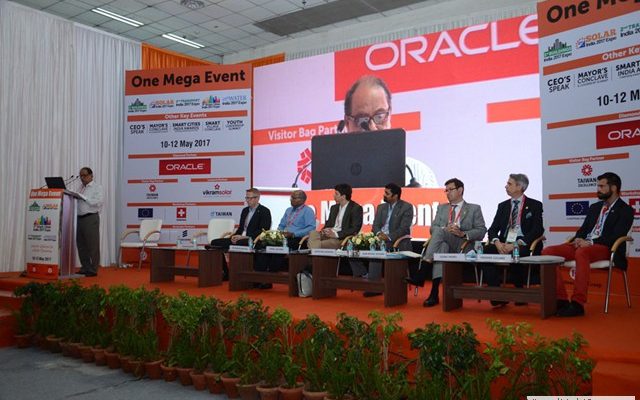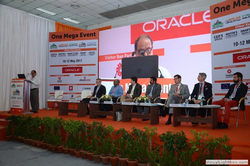ICLEI South Asia at the Smart Cities India Expo 2017

Recognizing smart cities as an important platform to drive progressive change, the 3rd Smart Cities India Expo was held from the 10th to the 12th of May, 2017 at Pragati Maidan, New Delhi. The three day event facilitated discussions around the challenges and solutions related to the sectors of buildings, solar energy, transport, smart cities and water.
ICLEI South Asia participated across several parallel sessions on all three days highlighting work that fits in with the Smart Cities Mission.
Presenting lessons learned and introducing the Smart City Web tool developed under the project ‘Supporting Smart Urban Mobility and Built Environment in Indian Cities’.

ICLEI South Asia was represented by Mr. Ashish Rao Ghorpade, Programme Coordinator- Urban, in the session,’Urban Design: The Role of Architecture’, held on the 10th of May. He discussed the role of efficient and green buildings in smart cities drawing from ICLEI’s experience of working on the project‘Supporting Smart Urban Mobility and Built Environment in Indian Cities’. This project is funded by Shakti Sustainable Energy Foundation and aims to build the capacities of four smart cities (Jaipur, Udaipur, Kakinada and Visakhapatnam) to develop smart, built environment action plans. These plans will focus on influencing urban mobility and the buildings approach which can feed into ongoing efforts of the Smart City Program.
He also presented the features of the Smart City Web Tool developed under the project. The tool will act as a support application for government agencies and other stakeholders to easily understand and implement smart city plans. The session explored urban landscaping, design for new cities/townships and refurbishments of existing cities.

Ms. Ruchita Bansal, Manager- Urban, who is actively working under the same project, spoke on the panel organized as part of the session, ‘Parking Infrastructure and Management for Smart Cities’ on the 12th of May. The session explored the challenges and the potential solutions to parking in Smart Cities. Discussion ranged from the importance of integrating regulation and developing legislation to technologies that will help to facilitate parking operations. Ms. Bansal stressed on the importance of city buy-in and reliable data in the context of devising parking management and infrastructure solutions.
Indo-Swiss Partnerships in Smart Cities, introducing the CapaCITIES approach of low carbon, climate resilient city development.

The session, ‘Swiss innovations for Smart Cities in India’, held on the 11th of May, introduced partnerships of Indo-Swiss cooperation and business. Projects and startups which were relevant to the context of Smart Cities and were supported by the Swiss Agency for Development and Cooperation (SDC), including the project CapaCITIES, were discussed in this session.
Setting the context for the ensuing discussions, Dr. Andreas Baum, Ambassador of Switzerland to India and Bhutan, remarked that "Cities will be hotspots of India’s sustainable development". Mr. Asok Narayan Bhattacharya, Mayor of Siliguri, in his address said "Urbanisation is inescapable and the participation of people is essential to make the process sustainable". Mr. Ghorpade, representing ICLEI South Asia, deliberated on how low carbon, climate resilient development was being supported in four fast growing, diverse Indian cities (Rajkot, Coimbatore, Siliguri and Udaipur) under the CapaCITIES project. The rest of the session touched upon Swiss innovations within the sectors of water, buildings, sanitation and transportation and how it could be applied within Smart Cities.
The CapaCITIES project, supported by SDC, aims at achieving a lower greenhouse gas emission growth path and increasing the resilience of the four cities to climate change.
Role of ecosystem services in addressing health of a city, perspectives from INTERACT- BIO.

In the Expo’s final session on ‘Health and the Cities’ on the 12th of May, discussions centred around emerging issues in urban environmental health, public health challenges and the innovations that could ultimately improve services and infrastructure creating smart, healthy and self-aware cities. ICLEI South Asia’s Dr. Monalisa Sen, Senior Manager- Sustainability Management, presented how healthy ecosystems can provide multiple benefits to the various urban systems of a city including health. This approach is being adopted under the INTERACT-Bio project which will be implemented in the cities of Kochi, Mangaluru and Panaji.
INTERACT-Bio or Integrated sub-national action for Biodiversity , funded by BMUB, aims at fostering synergies between climate protection and biodiversity by conserving and restoring ecosystems, essential to achieve the overall goals of the Convention on Biological Diversity and United Nations Framework Convention on Climate Change.




